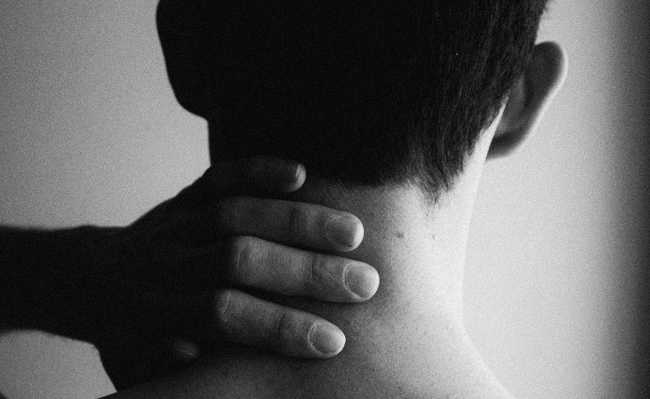Neck pain: possible causes and how to treat
Poor posture and wrong exercise are the main causes of neck pain. Understand!

Image: Deb Kennedy on Unsplash
The neck is made up of vertebrae that extend from the skull to the upper torso. The bones, ligaments and muscles of the neck support the head and allow it to move. Any abnormality, inflammation or injury can cause neck stiffness or pain.
It is common to experience pain or stiffness in the neck from time to time. In many cases, this is due to poor posture or overuse. Sometimes neck pain is caused by injuries from a fall, contact sports, or sudden movements. Most of the time, neck pain is not a serious condition and usually goes away within a few days.
But in some cases, neck pain can indicate serious injury or illness and require medical attention. If you experience neck pain that lasts more than a week, is severe, or is accompanied by other symptoms, seek medical attention immediately.
Causes of Neck Pain
Neck pain or stiffness can occur for a variety of reasons.
muscle tension and strain
It usually occurs because of activities and behaviors such as:
- Bad posture;
- Working at a table for a long time without changing your position;
- Sleeping with the neck in a bad position;
- Shake your neck during the exercise (in a wrong push-up, for example).
Injuries
The neck is particularly vulnerable to injury, especially in falls, car accidents and sports, where the muscles and ligaments of the neck are forced to move outside of their normal range.
If the bones in the neck (the cervical vertebrae) are fractured, the spinal cord can also be damaged. This type of neck injury is extremely dangerous.
Heart attack
Neck pain can also be a symptom of a heart attack, but in these cases it usually comes with other symptoms such as shortness of breath, sweating, nausea, vomiting, pain in the arm or jaw.
If your neck hurts and you have other symptoms of a heart attack, call an ambulance or go to the emergency room right away.
Meningitis
Meningitis is an inflammation of the thin tissue that surrounds the brain and spinal cord. In people who have meningitis, fever and headache occur with stiffness in the neck. Meningitis can be fatal and is a medical emergency that requires immediate attention.
other causes
Neck pain can also be caused by other health conditions. Understand:
- Rheumatoid arthritis causes joint pain, swelling, and deformities. If these changes occur in the neck region, this may be the reason for the pain;
- Osteoporosis weakens bones and can lead to small fractures. This condition usually occurs on the hands or knees, but it can also occur on the neck;
- Fibromyalgia is a condition that causes muscle pain throughout the body, especially in the neck and shoulder region;
- As you age, cervical discs can degenerate. This is known as neck spondylosis or osteoarthritis and can narrow the space between the vertebrae. In addition to the pain, the problem also adds stress to your joints;
- When a cervical disc protrudes from trauma or injury, it can increase pressure on the spinal cord or nerve roots. This is called a cervical disc herniation, also known as a ruptured or slipped disc;
- Spinal stenosis occurs when the spine narrows and puts pressure on the spinal cord or nerve roots as it exits the vertebrae. This can be due to long-term inflammation caused by arthritis or other conditions.
- Congenital anomalies;
- Infections;
- Abscesses;
- Tumors;
- Cancer of the spine.
When to see your doctor
If symptoms persist for more than a week, consult your doctor or physician. It's also a good idea to seek assistance if you have:- Severe neck pain with no apparent cause;
- Lump in the neck;
- Fever;
- Headache;
- Swollen glands;
- Nausea;
- Vomiting;
- Difficulty in swallowing or breathing;
- Weakness;
- Numbness;
- Tingling;
- Pain radiating through arms or legs;
- Inability to move your arms or hands;
- Inability to touch chin to chest;
- Bladder or bowel dysfunction.
If you have an accident or fall and have neck pain, seek medical attention immediately.
How to Treat Neck Pain
The health care provider will perform a physical exam and review your entire medical history. Be prepared to let him know the specifics of your symptoms. Also talk about any medications or supplements you are taking.
Even if it doesn't seem related, you should also report any recent injuries or accidents you've had.
The treatment of neck pain depends on the diagnosis. In addition to a complete history and physical examination, you may also need some tests to determine the cause of your neck pain.
How to Relieve Neck Pain at Home
If you have a slight neck pain or stiffness, follow these simple steps to relieve it:
- Apply ice for the first few days. After that, apply heat with a compress or taking a hot bath;
- Take over-the-counter pain relievers such as ibuprofen or acetaminophen;
- Take a few days off from sports, activities that aggravate your symptoms, and heavy exercise. When you resume activities, do them slowly so as not to aggravate your symptoms;
- Exercise your neck every day. Slowly stretch your head in side-to-side and top-down movements;
- Keep good posture;
- Avoid placing the phone between your neck and shoulder - this can cause dangerous text neck syndrome;
- Change your position often. Don't stand or sit in the same position for too long;
- Give your neck a gentle massage;
- Use a special neck pillow to sleep;
- Do not wear a neck brace without medical approval. Incorrect use of this type of equipment can worsen symptoms.
What is the outlook for people with neck pain?
Many people experience neck pain because of poor posture and muscle tension. In these cases, neck pain should go away if you practice good posture and rest your neck muscles when they are sore.
Yoga and regular exercise will help improve your posture. Using comfortable chairs, mattresses, and pillows also helps, as well as being aware of your posture when sitting on the couch or at other times of relaxation (when our posture tends to be worse).
If neck pain does not improve with home treatments, seek medical help.










